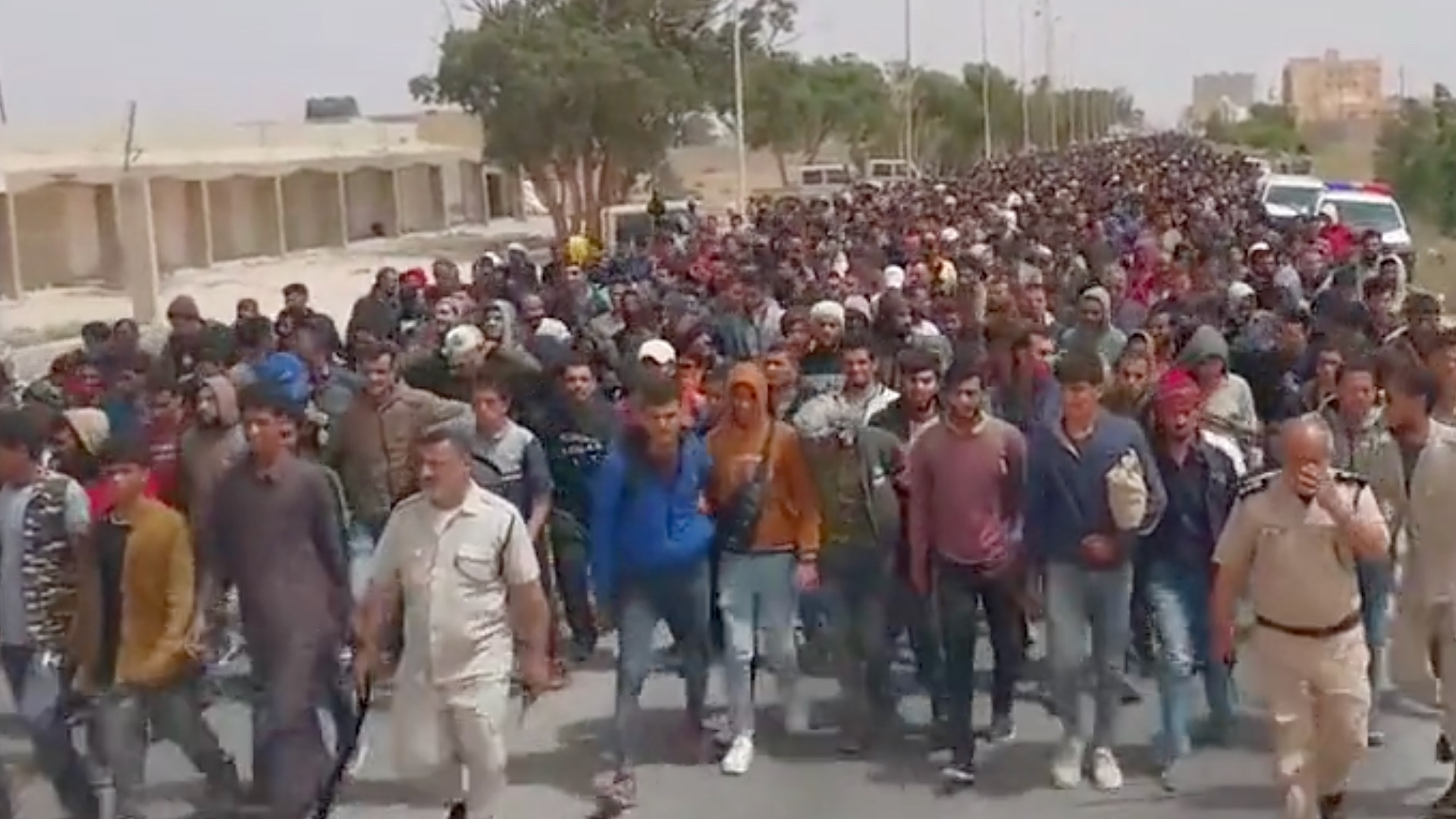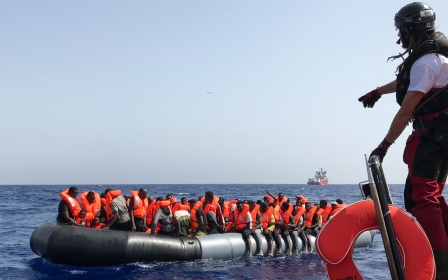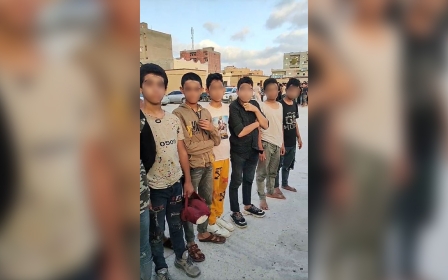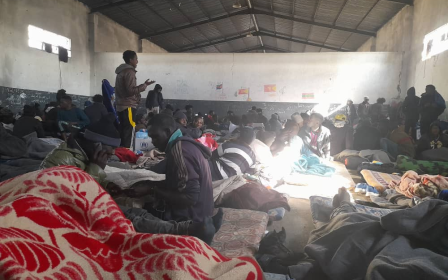Libya forces thousands of Egyptians to leave the country on foot

Thousands of people, the majority of them Egyptians, have been forced to leave Libya by foot after being detained and deported, according to migrant solidarity groups and media reports.
The deportations have mainly taken place over the first few days of June, and followed mass raids on smuggler warehouses in border towns in eastern Libya.
The monitoring group Migrant Rescue Watch told Middle East Eye that deportations were ongoing as recently as Thursday night.
"The migrants were loaded on several trucks," said Rob Gowans of Migrant Rescue Watch. "Some were transferred to Benghazi and some deported to Egypt."
An Egyptian security source told Reuters that only 2,200 of the 4,000 people deported were in Libya illegally. Deportees were detained at the border and then marched 2km into Egypt, the Egyptian security source added.
New MEE newsletter: Jerusalem Dispatch
Sign up to get the latest insights and analysis on Israel-Palestine, alongside Turkey Unpacked and other MEE newsletters
A Libyan security source also put the number of those deported at 4,000, while migrant solidarity groups reported that an estimated 6,000 were being detained in conditions that they described as 'tragic' in a customs hangar at the Musaid border crossing to Egypt.
A Libyan security source reported that the raids were conducted following a shoot-out between smugglers and security forces.
Videos posted on Twitter, which could not be independently verified by MEE, appear to reveal the scale of the crackdowns in the eastern towns of Tobruk, Emsaed and Musaid. They show crowds of migrants being rounded up in detention centres, herded onto trucks and marched near what is described as the Libyan-Egyptian border.
Human Rights Watch criticised the deportations and the behaviour of the Libyan forces during the operations.
'The conditions under which these people are rounded up appear to be incredibly violent and inhumane'
- Hanan Salah, Human Rights Watch
"The conditions under which these people are rounded up appear to be incredibly violent and inhumane," said Hanan Salah, Human Rights Watch's associate director for the Middle East and North Africa.
"This is absolutely unacceptable the way that people are being hoarded into a certain space and yelled at, with obscenities shouted at them... they are being forced to walk and run for long periods. They're apparently not being given the basic necessities they need. The de facto authorities or those who conducted it need to explain themselves."
According to a 2021 UN report, the majority of Egyptians in Libya are forced to rely on smugglers to get across the border. Hussein Baoumi, an Amnesty International researcher who interviewed Egyptian migrants in Libya, previously told MEE that this puts the migrants at greater risk of arbitrary detention by trafficking groups, some of them connected to militia groups led by eastern-based commander Khalifa Haftar.
"They have told me about [being] subjected to torture, being held in conditions that would be considered forced disappearances and extortion. This was quite a common experience," Baoumi told MEE.
Baoumi also spoke to people, some as young as 10, who reported being deported back to Egypt by forces based in eastern Libya.
The most recent deportations also follow crackdowns by security forces in western Libyan cities following violence between Nigerian and Sudanese migrants in Zuwara.
According to the International Organization for Migration, arrest campaigns of migrants have been happening routinely since April.
"Detention centres are overcrowded, [and] the international community is looking more at departures from the east given the increased [migration] numbers," the IOM said.
'Routinely at risk'
The UN has said that migrants in Libya are "routinely at risk of arbitrary or collective expulsion", charting a rise in deportations, with at least 7,500 migrants expelled from Libya's external land borders during 2019 and 2022.
The report also found that collective expulsions were being conducted without due process, with migrants frequently being denied the ability to challenge the lawfulness of the deportation, and some facing expulsion to countries where they may face persecution, torture and ill-treatment. According to Carolina Hernandez, a UN adviser on migration and human rights, this practice constitutes refoulement, which is illegal under international law.
The mass expulsions come amid an increase in Egyptians moving to neighbouring Libya. According to a 2022 IOM report, there is an estimated 144,543 Egyptian migrants in Libya, accounting for 21 percent of the total migrant population, the second largest share after Nigerians.
According to Baoumi, despite the pervasive risk of arbitrary detention and extortion, many Egyptians in Libya intend to stay there, rather than attempt to cross the sea to Europe.
'They have told me about [being] subjected to torture'
- Hussein Baoumi, Amnesty International
"One of the things that I remember, which was very surprising and shocking to me, is that many Egyptians that I met, have been living there for 10, 11 years… They were saying that present life was much better in Libya, than in Egypt... despite the risks, conditions and the threats," Baoumi said.
Split between rival administrations in the east and west of the country, oil-rich Libya is home to an estimated 500,000 migrants, a workforce that powers its economy. Many of those workers were previously unable to find a job in their home countries. According to the IOM, 41 percent of Egyptians working in Libya had been previously unemployed in Egypt.
In spite of all this, some Egyptian migrants still do attempt the journey across the sea to Europe, Baoumi said.
Though the majority of the people he spoke to intended to stay in Libya, Baoumi noted that younger migrants from Egypt were more likely to attempt the sea crossing to Europe, as they were more vulnerable to arbitary detention and extortion.
That leaves them open to the many dangers of crossing the Mediterranean by boat, with the IOM reporting that, within the first four months of 2023 alone, more than 440 people had drowned in the central Mediterranean.
Middle East Eye delivers independent and unrivalled coverage and analysis of the Middle East, North Africa and beyond. To learn more about republishing this content and the associated fees, please fill out this form. More about MEE can be found here.




